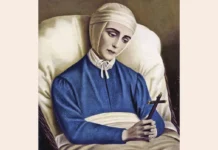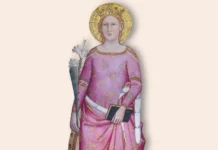Upon becoming acquainted with the urgent need for missionaries to evangelize America, the young seminarian resolved to go to the United States. It was there that Providence called him to develop his fruitful ministry.
Shortly before Christmas 1859, perhaps sensing his approaching departure from this life, the Bishop of Philadelphia paid a visit to the superior of St. Peter’s Redemptorist monastery, where he had previously lived. As he waited for the superior to arrive, he chatted with a lay brother. Suddenly, he paused and asked him:
— Brother Christopher, which would you prefer: a sudden death or to die after a long illness?
— I would prefer to die of some illness, in order to better prepare myself for eternity – he replied.
Gently, the holy Bishop rejoined: “A Christian, still more a religious, should always be prepared for a good death, and in that case a sudden one is not without its advantages. It spares us, as well as our attendants, many a temptation to impatience; and besides, the devil has not so much time to trouble us. In either case, however, the death that God sends is the best for us.” 1
A few days later, on January 4, 1860, he received Fr. Saurin, his former secretary, who came to wish him a holy and happy New Year. During their conversation he looked so sickly that the visitor offered to fetch a doctor. The prelate, however, put him at ease: “Not to worry, tomorrow I will be fine!” 2
In fact, the next morning there seemed to be an improvement. Nevertheless, after lunch he was unable to recognize a confrere, Fr. Urbanczek, who came to visit him. The priest expressed his surprise at his glazed expression, but the Saint replied that he only needed to go out into the street for some fresh air and he would feel better. His indomitable character spoke louder than the terrible discomfort he felt!
That afternoon, he went out to take care of some business related to the diocese. They were the last steps he would take in this valley of tears: having walked a few blocks, he collapsed in the middle of the street. Concerned passersby quickly carried him, still breathing, to a nearby house. Summoned urgently from the Cathedral, Fr. Quinn brought him the holy oils. However, on the divine clock, his time had come: at forty-eight years of age, he surrendered his soul to God.
This prelate was St. John Nepomucene Neumann, of whom his predecessor in the Diocese of Philadelphia, Bishop Francis Kenrick, wrote: “A bishop like that could only die walking in the street, with his soul open, every hour and every minute, to his Lord and God.” 3
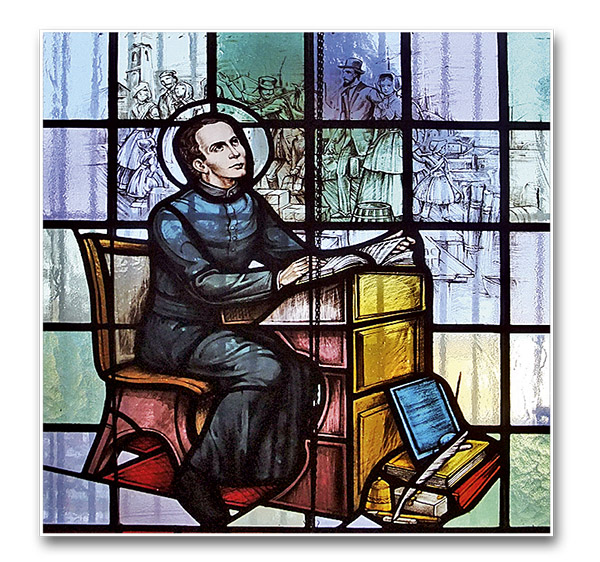
Purity and seriousness from childhood
His origins were far from the United States, where he lived as a missionary. He was born in Prachatits, in the fertile valleys of southeast Bohemia, in the present-day Czech Republic, on March 28, 1811. It was a Good Friday, perhaps a harbinger of his episcopal motto: “Passio Christi conforta me – Passion of Christ, strengthen me.” 4
At the baptismal font he received the name of the country’s patron: John Nepomucene. Philip Neumann, his father, a German from Obernburg, Bavaria, and his mother, Agnes Lebisch, provided him and his five siblings with an excellent Christian education. Four of the couple’s children consecrated themselves to God in religious life.
At twelve years of age, John went to study in Budweis, and there he stood out for his seriousness and resolution to become more pleasing to God each day. He thus preserved his baptismal innocence, not yielding to the bad influences of some companions.
At this young age he was already striving to mortify his senses, overcoming his fragile constitution. Eager to progress in the practice of virtue, he treated his colleagues with fraternal charity and took every opportunity to render them simple services. Although he participated in games with his friends, he never went to dances or the theatre, nor did he gamble.
Entrance into the seminary
Gifted with a great facility for languages, he studied Italian and French, his favourite, at this time, adding them to his paternal and maternal languages, German and Czech, as well as the Latin he learned in school. Having completed his studies in the classics, he entered philosophy with the Cistercian priests, obtaining excellent marks and distinguishing himself by his exemplary diligence and irreprehensible conduct.
He felt great veneration for the priesthood, but considered himself unworthy of it: “The idea of being a priest seemed extremely sublime to me at the time; I believed it far beyond my strength.” 5 In the Eucharist, however, he found the strength to request admission into the seminary of Budweis, and was one of those chosen from among eighty candidates to fill the twenty openings available.
It was then that he became acquainted with the Leopoldine Society, organized to support missionary work in America and to help the emigrants who were leaving en mass for the New World. Hearing of the urgent need for ministers to evangelize those lands, he made the resolution to go to the United States once he was ordained priest. He prepared himself for this by learning English, which he practised by speaking with Anglophone factory workers.
Sublime vision of the priesthood
From Budweis, John headed to Prague to complete his studies in the Archiepiscopal seminary, but he regretted the move… The professor of Dogmatic Theology “was more against the Pope than for him,” the Saint wrote in his diary; and the professor of Moral Theology “was too philosophical to be understood by his hearers”; and of the professors of Pastoral Theology he comments: “I had to do violence to myself even to listen to them, for the absurdity of their treatment of those subjects I fully understood; much less could I accept their opinions, which I regarded as heterodox.” 6
In matters of Moral Theology, he preferred to guide himself by the works of St. Alphonsus Maria de Ligouri, in whose precise and reliable teachings he found assurance for his sensitive conscience.
The young John Nepomucene aspired to be a priest who was fully dedicated to the glory of God and the salvation of souls, and he desired that all his seminary confreres would be the same. Nevertheless, an entry made in his diary some years later shows that he found himself obliged to lament their attitudes: “Many have but little faith, and others are wanting in that zeal which quickened Christ and stimulated the Apostles to bear all sorts of trials and hardship.” 7
Overcoming insurmountable obstacles
In 1835 Neumann was ready to receive the Sacrament of Holy Orders, but… something happened that is unimaginable in our days: due to an excess of priests in the diocese, the Bishop decided to postpone the ordinations indefinitely!
Intent on following the path of the priesthood as soon as possible, he wrote to several prelates and visited some personally, explaining the situation to them. None of them needed priests in their respective dioceses… Only after much prayer and sacrifice did he manage to obtain a good letter of recommendation addressed to the Bishop of New York, the Most Rev. John Dubois. Then, even lacking financial means and important pieces of personal documentation, he placed himself in the hands of Divine Providence and departed for America in 1836.
Upon his arrival, Fr. John Raffeiner, vicar-general for German emigrants, introduced him to Bishop Dubois. The latter received him as a gift from Heaven, for he did not have enough priests to serve such a vast diocese.
After a short period of preparation, John Neumann was ordained in St. Patrick’s Cathedral on June 25, 1836. From his youthful twenty-five-year-old heart overflowed this prayer, recorded in his diary: “O my Jesus, Thou hast given me the power to offer Thee Thyself to my God. It means so much to me. Lord, it is all Thy work!” 8
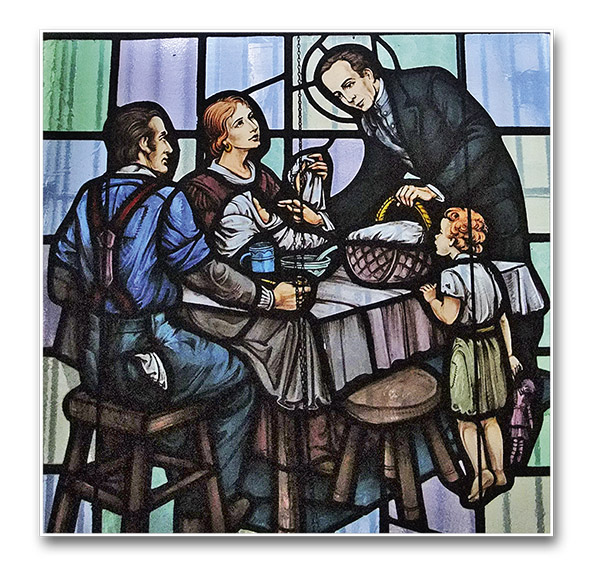
Missionary in the United States
Only four days later, he was sent to a parish in Buffalo. Along the way, he stopped in Rochester to minister to thousands of German Catholics who lived there like sheep without a shepherd. Reaching his destiny, he met Fr. John Prost, a Redemptorist priest whose friendship would be decisive when his life began to take its definitive direction.
With the advantage of his fluency in six languages, his fruitful priestly ministry began in the United States, concentrated especially on regions of heavy German immigration, where he encountered much hostility from people opposed to the Faith.
For some years he carried out intense activity in that vast territory. However, at a certain point, Fr. Prost alerted him to the danger of working alone, reminding him of the wise words of Ecclesiastes: “Væ soli! – woe to him who is alone” (4:10). It was with great joy, then, that he welcomed the company of his brother Wenceslaus, who came from Bohemia to heed the request made to him in a letter: “Anyone wishing to serve God will find much work in America.” 9
Son of St. Alphonsus Maria de Liguori
The ardent missionary efforts of Fr. Neumann undermined his health, obliging him to rest for some days. During this time he pondered the possibility of requesting admittance into the Redemptorists, which would allow him to participate in the charism of St. Alphonsus Maria de Liguori and bring him the immense advantage of living under obedience to a superior.
Having resolved to embrace the religious life, he made the request through Fr. Prost, receiving a quick and positive reply. The reasons for his late vocation are described by our Saint as follows: “For four years I strove to lead my communities to the fervour that I observed in the Redemptorist community of Rochester, and was unsuccessful. This was the reason, together with the natural, or better, supernatural desire to live in a congregation of priests, so as not to walk alone among so many dangers of the world.” 10
In the Congregation of the Most Holy Redeemer, which had very few members in the United States at that time, Fr. Neumann discovered the path to sanctity he had so long desired in the spirit of the founder. St. Alphonsus had always recommended refusing mediocre or merely dubious vocations: “‘Few and holy,’ he would say to his missionaries.” 11 His brother Wenceslaus accompanied him, becoming a Redemptorist lay brother.
In the government of the Redemptorists
It was not long before he was appointed superior of the Redemptorists of Pittsburgh. Convinced that religious draw down upon themselves divine grace by the radical observance of the rules of their institute, a reflection of the spirit of the founder, he sought to be meticulous in this matter and demanded the same from his subordinates.
And he was right, for as the famous Fr. Philipon notes, “the absolutely faithful observance of the religious rule, approved by the wisdom of the Church, is enough to lead souls to the highest peaks of sanctity. Thence the remark of Pope John XXII: ‘Give me a Dominican who faithfully observes his rule and constitutions, and even without miracles, I will canonize him.’” 12
As superior, he did not demand of his subordinates anything that he himself was not ready to do. If there was some disagreeable task to be done, he took it upon himself; if easy or honourable, he left it to his companions.
Appointed provincial superior of the Congregation in the United States, he worked with great dedication, even though his health began to show signs of decline. The Congregation had only thirty members at the time, very few to cover such a vast mission territory. Nevertheless, during his time as superior, ten new houses were founded in the country.
Raised to the episcopal See of Philadelphia
After several years as provincial, the Holy See decided to assign to him the direction of the Diocese of Philadelphia. To prevent him from rejecting the plenitude of the priesthood out of humility, Blessed Pius IX ordered him to submit to the divine will without hesitation.
Bishop John Neumann’s eight years of dedication to his episcopal duties were a constant testimony to his zeal for God’s glory, as well as to his spirit of prayer, humility and abnegation.
His constant visits to every corner of his diocese left the strong memory of a good shepherd and solicitous missionary. He normally spent three days in each place. He preached, heard confessions, inscribed candidates into religious confraternities, and strove to make the fruits of his pastoral visit lasting. His pious and honest soul thus spread light throughout the entire diocesan territory.
Filled with paternal affection and goodness toward members of the diocesan clergy, he showed total commitment to the sanctification of all, and he won their sincere esteem in return. The conferences and synods he held in the diocese reveal his high level of doctrinal knowledge. He wrote many articles in journals, published two catechisms, and a Bible History for students.
He is also considered the founder of Catholic schools in the United States, aimed at safeguarding the perseverance of future generations in the Faith and in virtue. On the advice of the Pope himself, he founded the Institute of the Sisters of the Third Order of St. Francis to care for these schools. He built more than eighty churches, established numerous religious institutions and introduced the Forty Hours of Eucharistic Adoration devotion, to foment the faith and piety of the people.
Deeply devoted to Our Lady, he received a formal invitation from Pius IX to be present at the solemn promulgation of the dogma of the Immaculate Conception, and he travelled to Rome with great joy. Before his departure, he published a pastoral letter in which every word, filled with unction, expresses his filial sentiments towards the Mother of God.
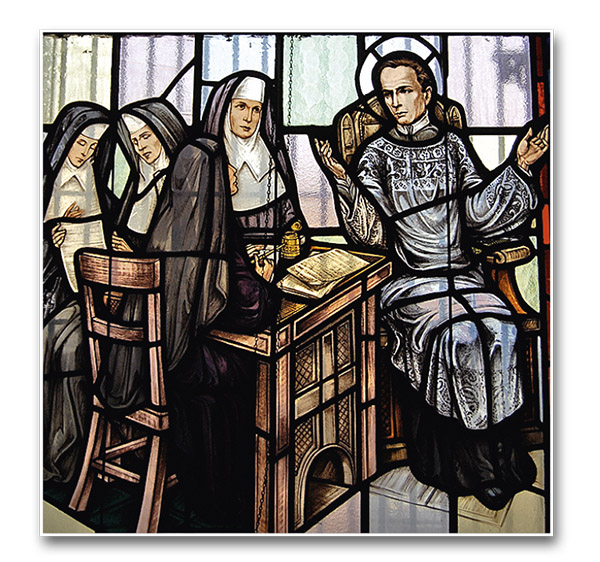
He fought the good fight
The fact that such a faithful shepherd was so prematurely and suddenly snatched from this life, as seen in the opening lines, could be considered a tragedy to human eyes. But God, in His unfathomable designs, knows the time at which each one of us must appear before Him, as Supreme Judge.
Bishop John Neumann fought the good fight throughout his life. He was ready to receive “the crown of righteousness” (2 Tim 4:8) of which St. Paul speaks, the “reward exceeding great” (Gn 15:1) promised by God to Abram. Therefore, he came before the Most High with a joy comparable to that of the good and faithful servants of the parable of the talents (cf. Mt 25:14-23).
These, upon hearing the Lord call them, “hasten to meet him, perceiving that they have reached the end of their struggles, toils and exertions. They go immediately and without qualms. What had they to fear from a master whom they had always loved and for whom they had always worked?” 13 ◊
Notes
1 BERGER, CSsR, John A. Life of Right Rev. John N. Neumann, D.D., of the Congregation of the Most Holy Redeemer. Fourth Bishop of Philadelphia. New York-Cincinnati-St. Louis: Benziger Brothers, 1884, p.429.
2 SOUZA, CSsR, Aluísio Teixeira de. Vida de São João Neumann. Um migrante a caminho do Céu. Aparecida: Santuário, 1987, p.109.
3 Idem, p.110.
4 BERGER, op. cit., p.432.
5 SOUZA, op. cit., p.17.
6 BERGER, op. cit., p.45.
7 Idem, p.85.
8 SOUZA, op. cit., p.43.
9 Idem, p.55.
10 Idem, p.59-60.
11 TELLERÍA, CSsR, Raimundo. San Afonso María de Ligorio. Fundador, Obispo y Doctor. Madrid: El Perpetuo Socorro, 1950, t.I, p.486.
12 PHILIPON, OP, Marie-Michel. Doutrina espiritual de Elisabete da Trindade, c.VIII, n.3. 2.ed. São Paulo: Paulus, 1988, p.203.
13 CLÁ DIAS, EP, João Scognamiglio. A Sure Path to Eternal Salvation. In: New Insights on the Gospels. Città del Vaticano-Nobleton: LEV; Heralds of the Gospel, 2013, v.II, p.462.



